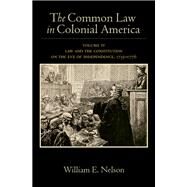The Common Law in Colonial America Volume IV: Law and the Constitution on the Eve of Independence, 1735-1776
, by Nelson, William E.- ISBN: 9780190850487 | 0190850485
- Cover: Hardcover
- Copyright: 6/1/2018
The eminent legal historian William E. Nelson's magisterial four-volume The Common Law in Colonial America traces how the many legal orders of Britain's thirteen North American colonies gradually evolved into one American system. Initially established on divergent political, economic, and religious grounds, the various colonial systems slowly converged until it became possible by the 1770s to imagine that all thirteen participated in a common American legal order, which diverged in its details but differed far more substantially from English common law.
This fourth and final volume begins where volume three ended. It focuses on the laws of the thirteen colonies in the mid-eighteenth century and on constitutional events leading up to the American Revolution. Nelson first examines procedural and substantive law and looks at important shifts in the law to show how the mid-eighteenth- century colonial legal system in large part functioned effectively in the interests both of Great Britain and of its thirteen colonies.
Nelson then turns to constitutional events leading to the Revolution. Here he shows how lawyers deployed ideological arguments not for their own sake, but in order to protect colonial institutional structures and the socio-economic interests of their clients. As lawyers deployed the arguments, they developed them into a constitutional theory that gave primacy to common-law constitutional rights and local self-government. In the process, the lawyers became leaders of the revolutionary movement and a dominant political force in the new United States.
This fourth and final volume begins where volume three ended. It focuses on the laws of the thirteen colonies in the mid-eighteenth century and on constitutional events leading up to the American Revolution. Nelson first examines procedural and substantive law and looks at important shifts in the law to show how the mid-eighteenth- century colonial legal system in large part functioned effectively in the interests both of Great Britain and of its thirteen colonies.
Nelson then turns to constitutional events leading to the Revolution. Here he shows how lawyers deployed ideological arguments not for their own sake, but in order to protect colonial institutional structures and the socio-economic interests of their clients. As lawyers deployed the arguments, they developed them into a constitutional theory that gave primacy to common-law constitutional rights and local self-government. In the process, the lawyers became leaders of the revolutionary movement and a dominant political force in the new United States.






